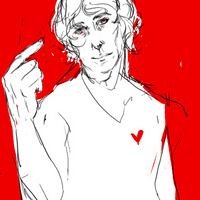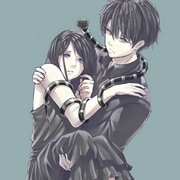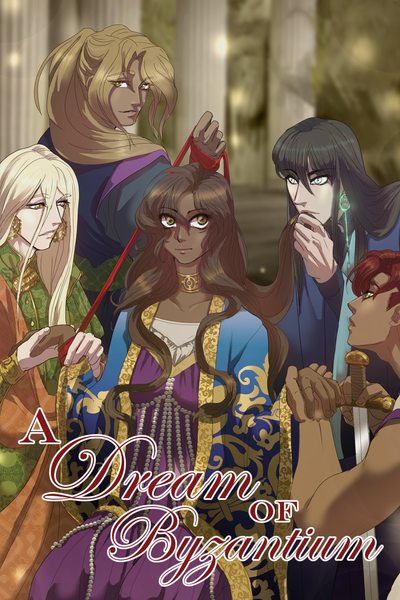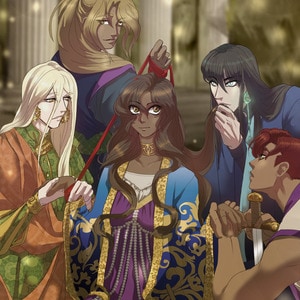Once it was all resolved, she climbed back upstairs to get some air.
“What do you think he saw?” she asked Phobos. “Are there monsters in this world?”
“None that I know of. But strange things may happen. Those who spend their lives at sea are quite superstitious.”
“The trierarchos seemed like a very practical man.”
“A leader has to see beyond such things; it matters little what’s real or imaginary. As you can see, regardless of whether the monster or the curse exists, he believes in it, and that should be enough.”
Ophelia considered Phobos’ words; outside of what could be taken at face value, they were quite telling of who the man beside her was. There were moments were he stopped existing as a warrior, when she caught glimpses of what he might’ve been like as a prince. The blood and the grime faded away, and she could see him walking through a hall, court following his every move.
She felt voyeuristic; removed from the scene, almost. Contemplating how that man’s destiny, which was so literary, so mythical, had clashed with hers. A mundane profile, a set of descriptors of a birth date and a college career and likes and dislikes, the storylines of modern life contrasted against the high fantasy epic of an exiled prince looking to take back his throne. She realized, once again, how dream-like it all was.
“What would you do if one of your men became crazed like that?” she asked, intruding in that dream to interview her character, try to unravel the real out of the myth.
“If we were in the palace, dress him as a jester and let him rave and rant to his heart’s content,” he said. “If we were in a battlefield, strike him down before his madness infects others.”
“You will run out of men at some point.”
“To err on the side of caution, one should always bring more than what is needed,” Hyperion’s voice said from behind. “Especially when it comes to men, one should account for some of them falling prey to some folly or another.”
They both turned around. Ophelia frowned at the merchant. “Humans are not things that can be replaced when they’re broken.”
“A philosopher says,” Hyperion quipped. “I’m a merchant, and the exiled Phrygian is a prince, neither of us have the luxury to speak in absolutes.”
The lazy smile on his face didn’t falter as Phobos surged forward, alarmed at his words. No one in their party had revealed to the Chaldean the true identity of the stowaways he was trafficking; it was too dangerous a secret to divulge.
“Who told you?” the prince muttered through gritted teeth, hands grabbing tightly onto the other man’s shoulders. “Speak!”
The merchant rolled his eyes.
“A mercenary does not hold themselves in the way you do; that you were a nobleman, it was easy to tell. And lastly the men you killed could’ve only conspired against you; and who would put such an effort, if not for a prince?”
Phobos narrowed his eyes, but let him go. “You should know better than to speak of this to others.”
“I am nothing if not opportunistic, your highness,” Hyperion smirked. “I simply hope my good deeds are remembered.”
The warrior relented, and the royal stepped up. “You will get as good as you give, that I can promise,” he said calmly as if a moment before he hadn’t been threatening the merchant. “When we arrive in Arqa I will arrange it so that the road to Raqmu is always open to you.”
Hyperion bowed his head, closing his eyes for a second as a sign of acknowledgment. “If only you were this charming before. I should’ve known that you prefer my company as a man.”
It was clear that regardless of whatever arrangements he could get out of their acquaintance, Hyperion would never pass the opportunity to get a raise out of Phobos. The prince visibly controlled himself, and simply looked away. “Your deceitful ways will always be distasteful to me.”
“Oh? I must’ve misunderstood. I thought you enjoyed a little trickery, as long as it came wrapped up in a dress,” Hyperion turned towards Ophelia. “Right, lady Iceni?”
Ophelia raised an eyebrow and shrugged; it was clear the Chaldean was fishing for information, trying to get the impulsive Phobos to reveal something in his haste to defend her. When the prince opened his mouth to speak, she barely touched his arm; the gesture, somewhat more intimate than she’d intended, made him flinch.
“If you want to know something, ask your questions,” Ophelia said with a stern tone. “You will know as much as you need to, and nothing more.”
“I’m afraid I’ve been too rude when I simply was trying to have a little fun. I apologise,” the merchant conceded, bowing his head towards her. “Perhaps when we arrive and as we go through our business together I will get more chances to earn your trust. I will be looking forward to that, certainly.”
He excused himself, and made a tactical retreat. Ophelia sighed, and knew she’d have to pacify an irate Phobos, although she couldn’t quite understand what about Hyperion’s playful manner bothered him so.
“Don’t mind him,” she said, “he’s trying to get a raise out of you.”
“A man like him is given a stone, and after grinding his wheat with it, squeezes the thing until water comes out,” the prince said with narrowed eyes. “It’s best to only deal with him as much as one has to, and no more.”
“True,” Ophelia conceded simply, before turning back. “Should we go back downstairs? The sun is starting to come down, and the breeze is turning chilly.”
They both made their way back into their little space; the chat moved away from Hyperion and his ways back into Ophelia’s world. She shared with Phobos more about universities; in turn, he told her about how such things worked in Phrygia, and what was the custom in those lands. She noticed that his manner had noticeably changed from the initial stoic ambivalence and the later hostility; he seemed to have warmed up to her. He certainly made for very entertaining and interesting conversations, in spite of his very rigid world view.
Aristides came to join them a few hours after sunset, and they both enjoyed dinner together. The oarsmen had been called off, as a good wind had begun to blow and the sails had been let loose to catch it. The helmsman came around to thank Ophelia for her help, and also to remind them not to walk on the deck during the night.
“One of those seamen’s superstitions, my lady,” he explained. “We all follow it. The rule is that we’re either all together after dark, or we stay hidden. Otherwise, bad things start to happen.”
Any objections that the three passengers might have had were left unsaid. After the man had gone, the conversation turned towards other topics; as the stars rose their voices died down. It wasn’t long until they all turned in for the night.
Around midnight, Ophelia emerged from her dreams covered in cold sweat and a racing heart. Desperate to understand why her body had responded so, her mind clawed at the darkness, trying to retain whatever images it could of the things that had been revealed while asleep. Yet like water, it all escaped from her grasp: the only thing that remained was a vague feeling of trepidation.
She opened her eyes and stared at the dark. Slowly, her breathing evened out and she began to relax. The oarsmen all rested in makeshift beds beyond the wall of amphoras that Aristides and Phobos had set up; their snores echoed softly in the large hull. Amidst their noises, the sound of timid footsteps emerged. Slow, unsure, they wandered from somewhere in the back closer to her; bare feet striking the wooden planks, looking for the stairs to the upper deck. Ophelia’s mind was delirious, half asleep and half awake, and it didn’t think much of it – it played around with its significance, part placing it into a completely unrelated scenario before submerging it into irrelevance as she plunged once more into slumber.
It wasn’t until the next morning that the footsteps would be plucked from her memory to escort the words the helmsman had said to her the day before. A commotion in the upper deck greeted all the late risers when a group of sailors began their tasks at dawn: shouts and laments began to be heard as the body of a man was found lying next to one of the sails’ masts. Ophelia was roused from her sleep by an anxious Aristides, and it was at the mid point of her climbing the flight of stairs leading to the scene of the crime that her mind was coherent enough to put two and two together.
Someone had broken a taboo.
“It happened, it happened!” she heard the helmsman say through gritted teeth as he grabbed at his hair. “This damned kid...!”
Aristides opened the way for her, moving curious and disturbed oarsmen to one side or the other as he walked closer to the centre of the commotion. Hyperion and Eon were already there; Phobos was with them, crouched next to the body. One look at the victim, another for the young man who was being sternly stared at by the Chaldeans; that was enough for Ophelia to understand what was happening.
The one who had broken the taboo was the young oarsman from the day before.
“Ah, lady Iceni,” Hyperion greeted her. “I’m afraid we’re having a hard time trying to piece together what happened. Would you care to speak to this man?”
Ophelia nodded. “I heard someone walk up to the deck last night,” she said to the dead man’s friend. “Was it him?”
“I was asleep,” he replied. “I don’t know what happened. He’d calmed down by the time we all retired for the night. He went to sleep early. I woke up at dawn, and he was already gone.”
Hyperion showed no sign of disappointment after Ophelia recounted the exchange. If anything, he seemed almost bored, as if the whole ordeal was an inconvenience he would’ve rather avoided. “I agree with you,” he said, after the woman had shared her thoughts with him. “Something unsettled him yesterday, and he thought he’d disregard the warnings to try and find an answer for it. It didn’t quite pay out for him.”
Ophelia took a look at the body. Three people had been called to search any signs of life; save for the slight discolouration in the lips the corpse looked for all intents and purposes as fresh as any of the sailors staring fearfully at it. “How did he die?”
“I can’t tell,” Phobos answered. “There are no wounds and no marks on his body. I can’t detect any evidence of poison, either.”
“I’ll call the men to dispose of the corpse,” Eon said. He looked just as bored as Hyperion.
Ophelia, used as she was to the procedural nature of a life time of crime shows, felt horrified at the thought. “Wait! We need to find out what happened!” she cried.
“It’s clear what happened: his own indiscretion killed him,” Eon replied. “This will only distract the crew and fill their heads with nonsense.”
“But what if he was murdered? What if there is something dangerous out there? We need to know!”
“There is danger everywhere, my lady,” Hyperion replied with a condescending smile. “That is an accepted fact by everyone in this crew. The nature of it doesn’t concern us; we know it exists and that’s sufficient. Paying too much attention to it only creates more trouble.”
“But… but doesn’t it bother you? That he’s dead?”
“I have other seventy men to worry about.”
As they tried to swing the corpse out into the sea, both sailors screamed in surprise, dropping it heavily onto the deck. The majority of the crew had gathered outside at that point, and their curiosity made it difficult for Ophelia to see what was happening. She caught a glimpse of greenish fingers twitching, and heard more surprised shouts.
Then, all hell broke loose.
The corpse had sprung back to life. A half-lidded wet stare that looked at nothing faced one of the sailors that had tried to throw it to the sea; its mouth was open, slack and dumb. Legs and arms twitched horribly as it struggled to stand upright; animated by an unseen force, it then reached out towards the nearest living thing. Horrified screams rang around the scene as, before anyone could make sense of what they were seeing, the corpse grabbed one of the crew men with enough strength to shatter his fingers. Forcing the panicking man’s face next to its own, it opened its mouth with enough violence to dislocate its own jaw. The cracking sound of bones coming apart was met with a deep wet rumble, signifying what was to come.
Crawling out from within the corpse’s throat, worm-like creatures reached out towards the sailor, landing on his face, his neck and his arms. Small tendrils extended from their bodies to attach themselves to the man’s skin; once they had made contact, they embraced the exposed flesh, and violently began to burrow themselves in it. The sailor’s screams silenced everyone else’s: the creatures were tearing him apart, and although he cried desperately for help, everyone was too terrified to take action.
A single soul was ready for action: a sword cut through the corpse, which finally relented his hold on the poor sailor. The victim fell to the floor, writhing in agony as the parasites still tried to take hold. The reanimated body, however, continued to twitch. From within the wounds no blood sprung forth: only tendrils, small and swirling like those that the worm-like creatures used as hands and feet, and they folded in on themselves, attaching to the exposed flesh and bones and twisting it into strange poses.
Phobos swore after swinging his sword two more times: after each time, the body became more distorted, but hardly less animated. Ophelia, who had seen too many movies not to know that blunt force would not be effective against such dangers, stopped him from continuing his folly:
“I have an idea,” she said, before pushing her way towards Hyperion. The Chaldean merchant was just as unsettled as the rest of the crew, looking genuinely fearful this time.
“Send the crew under the deck,” she said to the merchant. “We’re all in danger if this thing tries to grab someone else. It will keep multiplying.”
“We need to get rid of it,” Eon snapped. “We’ll get some sailors to throw it off board!”
“No! You’ll put them at risk! This thing is looking for hosts, whatever it is.”
As she said it, another sailor’s panicked screams joined the tumult. “How many more men do you want to waste?” she pressured them.
“And what do you propose we do?” Hyperion asked her. “Are we to wait below deck until the creature gets bored and jumps off ship?”
“No, I can get rid of it.”











Comments (0)
See all